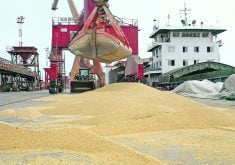Instead of a single prevailing world trading order, Morgan Stanley sees the development of a number of different spheres
The coming world market will be a lot more complex than many now expect, says a strategic analysis by Morgan Stanley, the global investment bank.
While talk about moving away from China and reversing globalization trends have been around for years, other factors are less discussed.
Morgan Stanley sees a future world order of “multipolarity,” with no single prevailing world trading order. The company sees the development of a number of spheres, with each following its own rules.
“In a multipolar economic world, we’ll see groups of nations with enough influence and incentive to pursue economic strategies that, if achieved, do not substantially follow the same direction of other global power centers,” stated Michael Zezas, Morgan Stanley’s head of American public policy research, while introducing the paper.
Read Also

Flax sector sees omega-3 opportunity
SASKATOON — A global shortage of omega-3 oils could be an opportunity for the flax sector, says an industry official….
For farmers and food producers, Morgan Stanley provides reasons to relax. Agriculture and food are not seen as key to vital technologies necessary for national security and economic strength. Those are likely to be forced to regionalize within specific spheres.
Morgan Stanley sees some industries being sharply affected by the breaking down of the globalization ethos that reigned until the late 2010s, and from that, will spring regional players.
Other less-sensitive industries will need to slow their globalizations, while still remaining globally focused.
The group, including agriculture, will likely be able to carry on with most of its global market assumptions, said Morgan Stanley.
“Multipolarity tends to favour companies and sectors whose products and services don’t pose a threat to economic or national security,” says the paper.
Companies with complex supply chains, like advanced manufacturing, and those whose products are seen as vital for national security and health will face continuing pressure to serve domestic or regional needs, especially in the United States.
The U.S. has shoved the world away from global free trade during the last few years. That trend also prevails in many other regions.
“Over the past three years, the U.S. has pulled out of several high-profile multilateral agreements,” says the paper.
“At the same time, more voices are rejecting the U.S. veto and outsized EU influence at the World Trade Organization, the World Bank and the International Monetary Fund. All of these conditions contribute to a multipolar world, where no single nation calls the shots.”
















